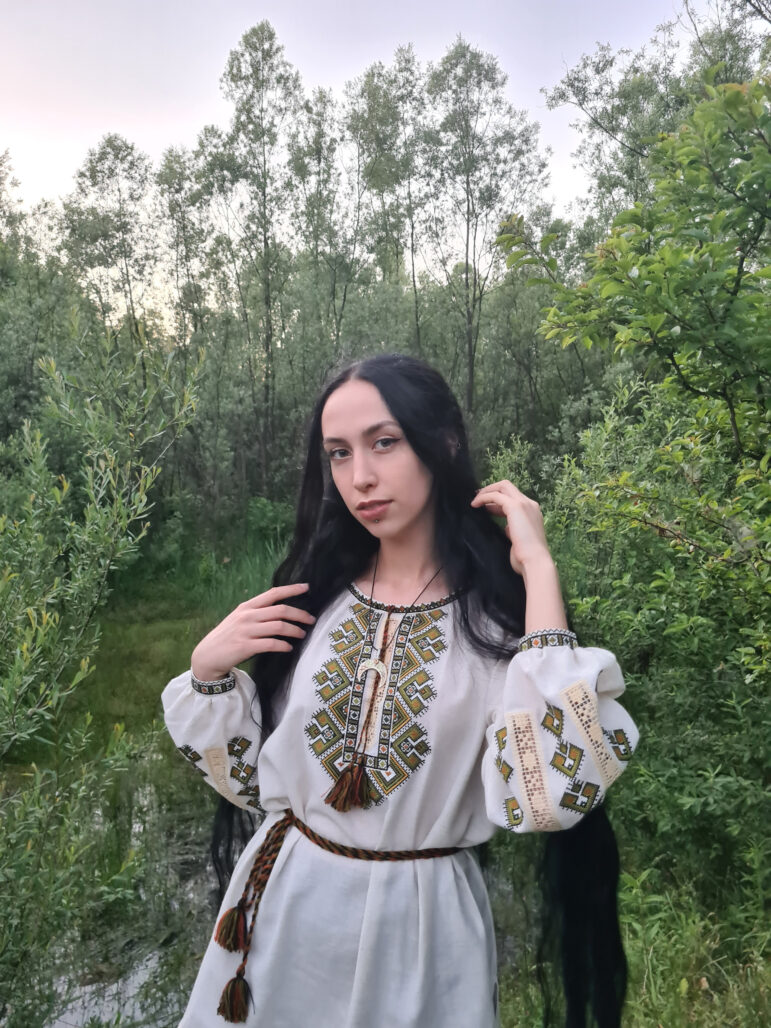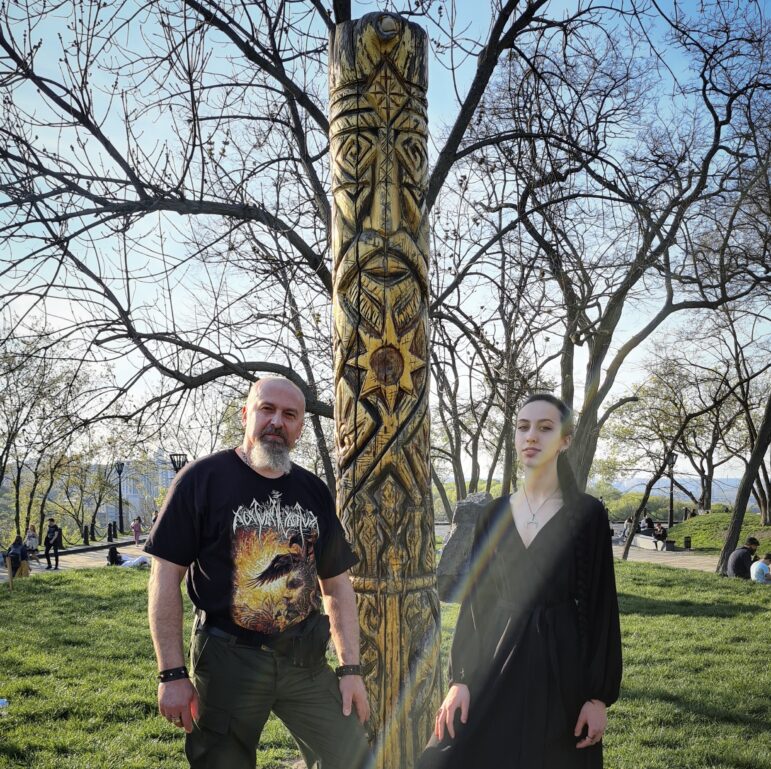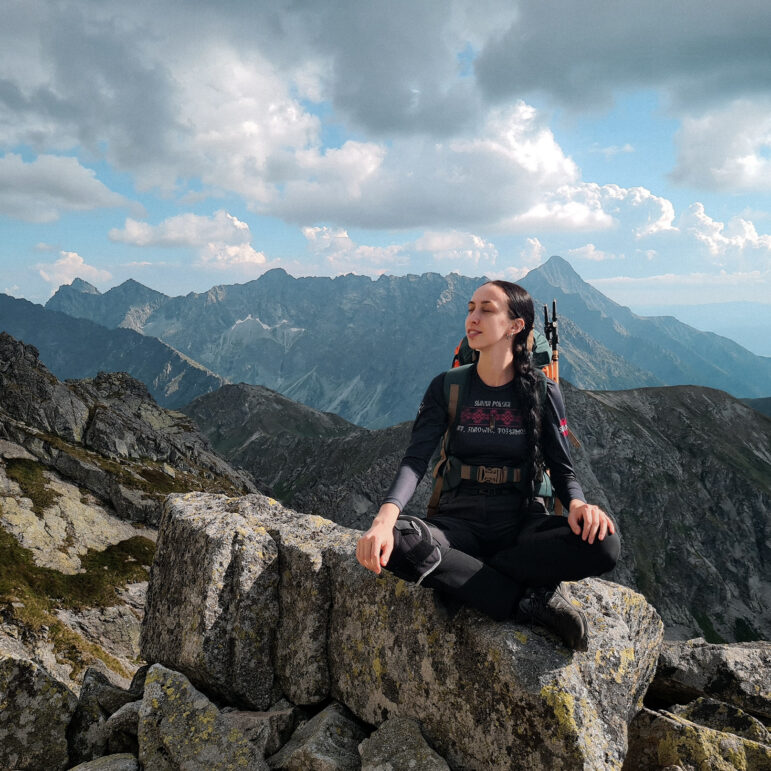Editor’s note: The Wild Hunt plans to publish a version of this interview in the original Ukrainian in the coming days.
KRAKOW, Poland – When Russia launched a full-scale invasion of Ukraine in February 2022, contributors to The Wild Hunt stepped in to cover the development of what progressively turned into the deadliest war on European soil since World War II. Among other things, TWH published interviews with scholars, statements issued by Pagan organizations, and the thoughts and experiences of Ukrainian Pagans.
Unfortunately, initiating contact with Ukrainian Pagans became progressively more arduous: issues such as disruption in the electrical grid, the mass mobilization of the civilian population, and linguistic and cultural barriers meant that The Wild Hunt had fewer opportunities to cover the war in depth. In February of this year, however, as the war passed its one year mark, new efforts were made to reach out. A number of Ukrainian Pagan social media personalities were approached about issues related to their faith as well as the ongoing war.
This complicated process was made possible by Helena Fialkovska, a Ukrainian acquaintance of the author and former student of folklore and indigenous studies. Helena acted as a consultant and interpreter, making sure to facilitate the communication between TWH and the interviewees, as well as translating all the messages that were sent back and forth.
The article you are currently reading is based on a translation of one Ukrainian-language questionnaire produced by Fialkovska. [1] As for the interview, we hope that nothing was lost in translation and that it will make readers living in the West understand better what living as a Pagan in war-torn Ukraine really means.

Victoria Vakaliuk in traditional dress [courtesy]
A jeweler and social media marketer by trade, Victoria Vakaliuk was born in Ivano-Frankivsk in west Ukraine, a city located at the foot of the Carpathian Mountains. Her father, a military medic currently serving in the armed forces of Ukraine and himself a Pagan, introduced her to the faith when she was a child.
Later on, as she grew up, she progressively built up a spiritual understanding of her own: “When I was a child, I did learn about Paganism from my dad, but faith was never inculcated in me. I came to it by myself when studying history and religious studies.” Victoria especially credits Dr. of Philosophy and Professor Halyna Lozko, who went on to establish the Native Faith Association of Ukraine in the late nineties.
In Ukraine, the years following the dissolution of the Soviet Union were marked by a rapid growth of new and alternative religious movements. Many of these, however, rejected polytheism and the “Pagan” epithet, opting instead for a form of Slavic-themed syncretist monotheism. This tendency was especially strong among organizations originating from Cold War-era Ukrainian-refugee communities in North America before later spreading out in Ukraine. Alongside these, one can also note the emergence of organizations influenced by either Occultism, Hinduism, or western contemporary Paganism, leading to a diverse scene, something that Victoria is keenly aware of.
“The Ukrainian Pagan scene is heterogeneous,” she says. “Some people follow the traditions of Scandinavian Paganism, some people follow the traditions of Ukrainian Paganism, some people follow the traditions of Celtic Paganism, and others confess everything at the same time. I think it’s because people get a little lost and often have no idea what to do and where to go when they become interested in Paganism.”
As for herself, Victoria is dedicated to the cult of Slavic gods and Ukrainian traditions, and in this, she is not alone: despite the major differences separating the various contemporary Pagan and Pagan-inspired Ukrainian spiritual movements, most are inclined to weave their faith around their distinctive national character. Victoria emphasizes this perspective in a succinct and straightforward way: “I am a Ukrainian Pagan. I respect the history and culture of my people, I try to follow the traditions of my ancestors and popularize Ukrainian culture.”
For someone as involved in her national heritage as Victoria, the full-scale invasion of Ukraine came not only as a shock but as a test of faith. By that fateful day of February 25, she had already been living in Poland for some time, but as news started coming up about Ukrainian cities being shelled and Russian troops making their way westwards, Victoria wished nothing but to head back home to help in whatever way she could.
“On the first day,” she says, “I felt great anger, shock, and fear for my relatives. I was ready to pack up and return to Ukraine. My country was in trouble, some of my friends and relatives were going to the front while the rest were waking up to the sounds of air alarms. I believed that I should live these difficult times together with them.”
However, before she was able to make her way back, Victoria began to get involved with the humanitarian effort taking place in Poland. She soon realized that she could be just as useful to the cause operating from there – for example, by helping organize fundraisers and coordinating the delivery of supplies.
“I quickly realized that I could assist the armed forces more effectively this way,” she says. “In addition, my relatives and friends in the military convinced me to do this as well. Over time I have managed to do a lot of useful things for the Ukrainian army here, and I will continue to do it. However, I definitely plan to come back to Ukraine this summer to stay there.”
When asked about the place of Paganism in Ukraine, especially since the beginning of the full-scale invasion, Victoria paints a portrait of a nation returning to its pre-Christian roots as it fights for its survival. According to her, the war has led Ukrainians to engage with their own national identity at a much deeper level than in the years prior to 2014. This inward soul-searching encompasses all aspects of Ukrainian traditions and, in her eyes, the Pagan native faith as well.
This spiritualization of Ukrainian identity appears to have only accelerated since last February, even in a country where Christian institutions have traditionally held much influence, which they often used to denigrate practitioners of alternative and Pagan faiths.
“Since the beginning of the full-scale invasion, the number of people who started to return to Paganism began to grow exponentially,” says Victoria. “I have noticed this in my communication environment, because there are acquaintances who were Christians, and last year they became interested in Paganism.
“In addition,” she says, “my Instagram page is visited by many people whom I do not know and they write to me with a request to recommend literature on Paganism, because they became interested in it. There is also an increase in people who are interested in Paganism in the army. My dad, who is a soldier of the Armed Forces of Ukraine, told me that he gets questions on Paganism from comrades. I think the growth of Pagans among the military, in addition to the previously mentioned reasons, is also connected with the cult of heroism. After all, according to Pagan beliefs, a heroic deed is represented as a higher rank, and after death in battle, a person goes to Valhalla, or to her Ukrainian counterpart, Vyriy.”
But even as she waxes on about the advance of her faith, even going as far as prophesying the ultimate demise of Christianity in her country, Victoria recognizes the dramatic context in which this all takes place: a war where her countrymen, soldiers and civilians alike, die at the end of Putin’s forces every single day. Besides her father, Victoria tells of numerous Pagan soldiers and friends currently engaged in the fight, some of whom died earlier in the conflict, and even one, a defender of Azovstal, who has been held prisoner for more than a year.
Truly, for Pagans as well, the war is always on one’s mind, and the Pagan Ukrainian native faith is unlikely to thrive were the country to fall. The survival of this form of Paganism can realistically only be assured by the survival and independence of the nation in the face of a bloody, unforgiving war.

Victoria and her father in front of a carving of the god Perun [courtesy]
When asked about potential misconceptions Westerners might hold about this conflict, Victoria mentions two main ones: who is to blame for it, and the role of western military support. Western media outlets, including TWH, have often put the spotlight on domestic opponents to Putin’s regime, but Victoria attributes much of her people’s suffering not to the Russian leader but to the ordinary people that are directly or indirectly engaged in the conflict.
“It was ordinary russians[2] who came to our land, not putin,” says Victoria. “Ordinary civilian russians who live in the russian federation pay taxes to the state and thus finance the war; ordinary russians work at enterprises that provide supplies for the invading army. Also, after every terrorist act by russians in Ukraine, a bunch of satisfied comments from civilian russians spreads through the social networks. So, even the death of putin, which of course is awaited by many people, is unlikely to end the war.”
The second point she wishes to underscore is that, in her view, Ukraine is not only fighting for its survival but for that of Europe at large, and that were military aid to Ukraine to cease, the conflict would likely engulf other states as well. Rather than flaming the flames of war, Victoria believes that military assistance guarantees the survival of her nation and, by extension, that of Europe:
“It is not possible to have peace with a terrorist country,” says Victoria. “The cessation of arms supplies will not ensure peace. We are holding back the invading horde at the cost of thousands of Ukrainian lives, including children and women, at the cost of maimed people, destroyed cities and villages, at the cost of ecocide. If it were not for the titanic efforts of the Armed Forces of Ukraine, the russian federation could have already come to Europe with the war. Would you like to make this your reality? No? Then say thank you to the Ukrainians that we are fighting them ourselves. Providing weapons is your contribution to the victory. Eventually, are you ready to take up arms yourself and go to war with the russians?”
As our conversation comes to a close, Victoria reiterates that, in these trying times, her faith has only grown stronger and helped her hold on and be strong. But as is often the case, faith without action goes only so far and she urges her fellow Ukrainians to increase their readiness: “We are facing difficult times,” she says. “Ukrainians need to prepare themselves and perform training in tactical medicine and shooting, if they have not already done so.”
As for people outside of Ukraine, she urges them to keep talking about the conflict, share information, and not let it disappear from news cycles, lest diminishing coverage lead to a weakening of support. Victoria also believes that, in the war against Putin’s forces, every cent counts and that one should not overlook donating even small sums of money or taking part in fundraisers like those she regularly organizes or relays on her social media:
“Every time you drink coffee, for you it’s a small thing, but you can also transfer the cost of the coffee to some donation collection for the Armed Forces. With such small donations, important donation collections for drones, for cars for evacuating the wounded, for night vision devices – are closed, and this can save lives. If you can’t donate, repost the donation collection – this is also a very valuable support.”

Victoria finding a place of strength in the mountains [courtesy]
As the war slowly but surely heads towards its year-and-a-half mark, no one can be sure how the situation on the ground will evolve, but it is certain to take an ever greater toll before peace can be achieved. Yet, amid the uncertainty, Ukrainians still have hope: hope for a future in a strong and liberated country, and for Victoria and likely countless other Ukrainian Pagans, a country where their faith may take a place of honor within the consciousness of the nation.
“I have always been in favor of restoring Ukrainian traditions and their popularization,” says Victoria, “but during the war I have realized how important it is and now I have a lot of inspiration and ideas. All that remains is to find the time. Perhaps, after the victory.”
[1] Fialkovska declined to receive payment for her work. She insisted instead that TWHsend money through the government-run United24 platform, something we urge our readers to consider as well.
[2] Victoria does not capitalize the words “Russia” or “Putin” in her statement. For the sake of authenticity we have maintained this practice in the translation.
The Wild Hunt is not responsible for links to external content.
To join a conversation on this post:
Visit our The Wild Hunt subreddit! Point your favorite browser to https://www.reddit.com/r/The_Wild_Hunt_News/, then click “JOIN”. Make sure to click the bell, too, to be notified of new articles posted to our subreddit.